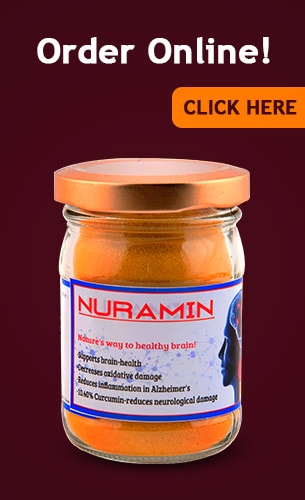Alzheimer’s Prevention with Turmeric

Turmeric, the spice that we use in our everyday cooking has myriad other uses as well. Due to its exceptional properties of being anti-inflammatory, antiseptic, antibacterial, antioxidant, to name a few, it finds use in many ways to grant us health in more ways than one.
Turmeric and Alzheimer’s
- It has been observed that turmeric is used extensively in Indian cooking. Also, there are very less cases of Alzheimer’s that have been reported in India. This goes to prove to quite an extent that there is a link between turmeric and Alzheimer’s.
- With the latest study being conducted on this spice, it has been found that curcumin content of Turmeric leads to lesser inflammation in the brain and this helps prevent the onset of Alzheimer’s and many such degenerative diseases of the brain.
Nuramin
- The active ingredient of turmeric, curcumin is extracted for maximum benefit by our organic processes at Bagdara Farms and we have come up with Nuramin which is a superb product that can greatly help lessen the symptoms of a dreaded disease like Alzheimer’s.
- It is a very potent product and reduces the inflammation in the brain and prevents degeneration of the nerve cells that happens as a result of this disease.
What is Alzheimer’s ?
- Alzheimer’s is such a disease that is feared by people and it mostly occurs in older people after their sixties or seventies. They start forgetting people, places and sometimes their own name and identity. But there is hope for the ones suffering from this deadly ailment. There is definitely some relation between turmeric and Alzheimer’s and this is what we will ascertain as you read further.
- The curcumin content in Turmeric is known to have anti-inflammatory properties and that is what is beneficial for the treatment of a degenerative disease like Alzheimer’s. We, at Bagdara Farms understand how heart wrenching it is to see your near and dear ones suffer from such a disease. This is the reason we have come up with a fantastic product called Nuramin that is fully organic and is manufactured through a process of home growing. This means that the product is free of any kind of chemicals or harmful substances.
Nuramin and Alzheimer’s
So what does Nuramin really do for Alzheimer’s? Let’s find out.
- It reduces the development of amyloid plaques that are formed as a result of this condition in the brain. Amyloid plaques are basically collection of protein elements that are held together in the brain and they lead to impairment of the brain cells, inflammation and also form free radicals that in turn damage the brain activity.
- All over the world, it has been observed that India has the least cases of Alzheimer’s. It goes to show that since we use a lot of turmeric in our cooking, it helps to lower the chances of contracting this brain damaging disease.
- If you need turmeric to work in the best way for your brain, then your ideal choice would be Nuramin. With its high content of curcumin, it is an amazing supplement that has a number of nutrients, minerals and vitamins that help to combat the symptoms that lead to Alzheimer’s.
- Since curcumin is very effective in inflammatory control and also has antioxidant properties, it is helpful to lessen the effects of Alzheimer’s. But by just taking turmeric in your diet may not help as much as taking a supplement like Nuramin from Bagdara Farms. It is an organically manufactured product which is free of pesticides and any chemicals etc.
- Nuramin also prevents the cell damage caused due to the free radicals and therefore, restores normal cell functioning.
- Antioxidant and anti-inflammatory properties add to the potency of this amazing product called Nuramin made in home-grown organic farming Farms at Bagdara.
- So, here’s proof enough that Nuramin will go a long way to tackle a scary disease like Alzheimer’s. Order your jar from Bagdara Farms right away and keep brain diseases at bay! Move towards the path of good brain health with Nuramin.
Click here for more details : https://www.ncbi.nlm.nih.gov/pubmed/29036814


